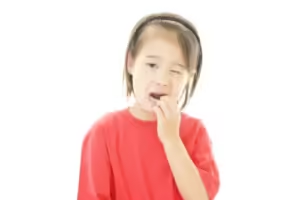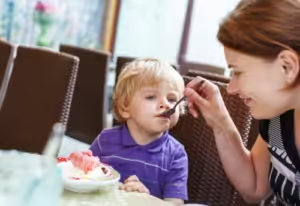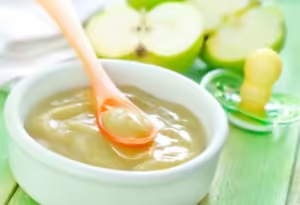Many moms have probably heard the story that “kissing your baby will cause tooth decay.” Is this story true? It’s worrying if your skinship ends up causing tooth decay. In this article, we’ll explain in detail whether tooth decay is really transmitted and why it happens. Please use this article as a reference.

Does kissing a baby give you cavities?
We often hear that kissing a baby can give them cavities. In fact, this is true. To be precise, it is not cavities that are transmitted, but the cavity-causing bacteria that mom and dad carry.
Babies are born without any cavity-causing bacteria. Even so, it is said that the main cause of cavities is infection from the parents.
This type of kissing also includes “indirect kissing.” Cavity bacteria can be transmitted by feeding a baby with a spoon that mom or dad uses, or by feeding a baby something hard that mom has chewed up and then given to them.
What are tooth decay bacteria?
First of all, what are cavity-causing bacteria? In the mouths of many adults, including moms and dads, there is a typical cavity-causing bacteria called Streptococcus mutans, along with various other bacteria. Babies do not have this bacteria when they are born.
When kissing, the Streptococcus mutans bacteria contained in the mother’s saliva can get on the baby’s lips and infect the baby’s mouth. This infection creates the possibility that the baby will develop cavities.
How do you get tooth decay?

Tooth decay is a type of infection caused by tooth decay bacteria. When tooth decay bacteria attach to teeth, they first produce plaque. They then use sugar that enters the mouth to produce acid, which dissolves calcium and other components of the teeth and creates holes.
This condition is called tooth decay. Tooth decay bacteria can only live in hard tissues, so they cannot survive in the mouths of babies who have no teeth. However, when the precious baby teeth come in, they take this opportunity to try and establish themselves.
What happens when a baby tooth gets decayed?
If decay in baby teeth is left untreated, it will progress and reach the root of the tooth. Pus will accumulate there. This pus will infect the newly grown permanent teeth with decay. It
is a big mistake to think that “baby teeth will grow out anyway, so there is no need to worry about cavities.” Proper care is essential. Because infants do not have subjective symptoms or can not communicate pain, it is important for parents to take proper care of their children and take them for regular checkups.
What you can do to prevent your baby’s teeth from getting cavities
So, what are some ways to prevent tooth decay infection? Here are some things you can do to protect your baby from tooth decay.
Countermeasure 1: Don’t transmit adults’ saliva to babies!

In a nutshell, preventing infection with tooth decay bacteria can be summed up as “keeping adults’ saliva from entering a baby’s mouth.”
Things to note
- Do not feed babies using tableware such as spoons or chopsticks that adults have eaten from.
- Do not kiss or share food with others.
- Do not give hard foods to children until they have been softened by being chewed by an adult’s mouth.
- Adults should also take good care of their teeth
Just by keeping the above points in mind, you can prevent infection with tooth decay bacteria! Prepare special tableware for babies and do not share it with adults.
And it’s not just about taking care of your children, moms and dads too should take good care of their own mouths.
Countermeasure 2: Get into the habit of brushing your teeth!
Once teeth have grown in, you should start brushing your child’s teeth. At this stage, it’s more about getting used to brushing your teeth than preventing cavities, but it’s important to make it a habit now. It’s
also said that simply drinking tea after meals and rinsing your mouth is more effective than doing nothing. However, you should be sure to brush your teeth thoroughly at least once a day.
Countermeasure 3: Set times for meals and snacks!

When food enters the mouth, it becomes acidic, but saliva helps to make it closer to neutral. However, if you snack a lot, your saliva can’t keep up, and your mouth will always be acidic and prone to cavities. Do you
give your child snacks too often? Set times for snacks and meals, and be careful not to eat too leisurely.
Snacks that are less likely to cause tooth decay
We recommend snacks such as rice crackers with low sugar content. Also, try giving nutritious foods such as boiled potatoes at snack time to limit the number of sweets you eat. It might be a good idea to try
sweets such as Ramune candy that contains xylitol.
Take care of your child’s mouth together

We have explained the importance of baby’s teeth. Some people may have been surprised to learn that tooth decay bacteria can be transferred to babies more easily than they thought. It is important to
protect your baby’s teeth, and it is also important to eliminate the mutans bacteria in your mouth. Let’s all take care of our mouths as a family.